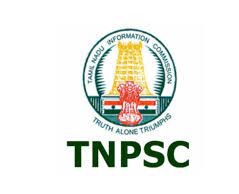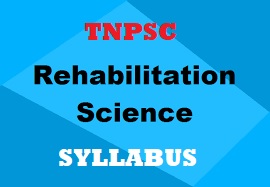TNPSC Rehabilitation Science Exam Syllabus : Tamil Nadu Public Service Commission
Organisation : Tamil Nadu Public Service Commission (TNPSC)
Exam Name : TNPSC Rehabilitation Science Examination
Standard : PG Degree Standard
Subject Code : 381
Announcement : TNPSC Rehabilitation Science Exam Syllabus
Website : https://www.tnpsc.gov.in/English/new_syllabus.html
TNPSC Rehabilitation Science Exam Syllabus
The TNPSC Rehabilitation Science Exam Syllabus are given below,
Related / Similar Syllabus : TNPSC Chemical Technology Exam Syllabus

Unit I: Introduction to Rehabilitation
1.1 Concept, Nature and Meaning of Rehabilitation,
1.2 History of Rehabilitation,
1.3 Need and significance of Rehabilitation Services,
1.4 Issues and Challenges in Rehabilitation Services
1.5 Competencies, Ethics and Attitudes of Rehabilitation Professionals
Unit II: Introduction to Disability
2.1 WHO International Classification of Impairments, Disabilities and Handicaps
2.2 Classification of Disabilities based on RPwD Act, 2016
2.3 Influence of Labelling, Stereotypes and Stigma on Disability
2.4 Historical Perspectives of Disabilities
2.5 Models of Disability Rehabilitation Services – Institutional, Home based Integrated, Community Rehabilitation Services and Inclusion
Unit III: Rehabilitation of Persons with Sensory Disabilities
3.1 Definition, signs and symptoms, classifications, causes, Characteristics and prevention of Visual Impairment, Hearing impairment, Speech and Language Disability
3.2 Early Identification and Assessment of Sensory disabilities
3.3 Misconceptions of Sensory Disabilities
3.4 Interventional Services for Persons with Sensory disabilities – Therapeutic, educational, vocational and Adaptive and Assistive devices in the services of Persons with Sensory Disabilities
3.5 Role of Family and community involvement in Rehabilitation Services of Persons with Sensory Disabilities
Unit IV: Rehabilitation of Persons with Locomotor Disability
4.1 Definition, signs and symptoms, classifications, causes, Characteristics and prevention of Dwarfism, Leprosy Cured person , Acid Attack Victims, Cerebral Palsy, Muscular Dystrophy
4.2 Early Identification and Assessment of Locomotor disabilities
4.3 Misconceptions of Locomotor Disabilities
4.4 Interventional Services for Persons with Locomotor disabilities – Therapeutic, educational, vocational and Adaptive and Assistive devices in the services of Persons with Locomotor Disabilities
4.5 Role of Family and community involvement in Rehabilitation Services of Persons with Locomotor Disabilities
Unit V: Rehabilitation of Persons with Chronic Neurological Disorder and blood disorders
5.1 Definition, signs and symptoms, classifications, causes, Characteristics and prevention of Multiple Sclerosis, Parkinson’s Disease, Haemophilia, Thalassemia, and Sickle Cell Disease
5.2 Early Identification and Assessment of Chronic Neurological Disorder and blood disorders
5.3 Misconceptions of Chronic Neurological Disorder and blood disorders
5.4 Interventional Services for Persons with Chronic Neurological Disorder and blood disorders – Therapeutic, educational, vocational and Adaptive and Assistive devices in the services of Persons with Chronic Neurological Disorder and blood disorders
5.5 Role of Family and community involvement in Rehabilitation Services of Persons with Chronic Neurological Disorder and blood disorders
Unit VI: Rehabilitation of Persons with Intellectual Disability and Mental Behaviour
6.1 Definition, signs and symptoms, classifications, causes, Characteristics and prevention of Intellectual Disability, Mental Illness, Autism Spectrum Disorder, Specific Learning Disabilities
6.2 Early Identification and Assessment of Intellectual Disability and Mental Behaviour
6.3 Misconceptions of Intellectual Disability and Mental Behaviour
6.4 Interventional Services for Intellectual Disability and Mental Behaviour – Therapeutic, educational, behavioural, vocational and Adaptive and Assistive devices in the services of Persons with Intellectual Disability and Mental Behaviour
6.5 Role of Family and community involvement in Rehabilitation Services of Persons with Intellectual Disability and Mental Behaviour

Unit VII: Rehabilitation of Persons with Multiple Disabilities
7.1 Definition, signs and symptoms, classifications, causes, Characteristics and prevention of Multiple Disabilities
7.2 Early Identification and Assessment of Multiple Disabilities
7.3 Misconceptions of Multiple Disabilities
7.4 Interventional Services for Persons with Multiple Disabilities – Therapeutic, educational, vocational and Adaptive and Assistive devices in the services of Persons with Multiple Disabilities
7.5 Role of Family and community involvement in Rehabilitation Services of Persons with Multiple Disabilities
Unit VIII: Rehabilitation of Persons with Behavioural Disorders
8.1 Definition, signs and symptoms, classifications, causes, Characteristics and prevention of Psychosomatic disorders, Addiction, substance abuse, criminal behaviours, delinquency, personality disorders and media addiction
8.2 Early Identification and Assessment of Behavioural Disorders
8.3 Misconceptions of Behavioural Disorders
8.4 Interventional Services for Persons with Behavioural Disorders – Therapeutic, educational, vocational and Adaptive and Assistive devices in the services of Persons with Behavioural Disorders
8.5 Role of Family and community involvement in Rehabilitation Services of Persons with Behavioural Disorders
Unit IX: Compendium of Schemes and Services in Rehabilitation
9.1 Role of National Institutes and Centres in Rehabilitation Services
9.2 Central Public Sector Enterprises – NHFDC and ALIMCO
9.3 Schemes of the Department – Divyangjan : DDRS, ADIP, SIPDA, DDRCs
9.4 Other Schemes – Scholarship, Accessible India Campaign, Awareness Generation and Publicity Scheme, National Fund for PwDs , National Trust Schemes, Swavlamban Group Mediclaim Policy for PwDs, New Initiative Schemes in progress
9.5 National and State Awards for Empowerment of PwDs
Unit X: Legislations and Policies Governing the Rights of PwDs
10.1 International Declarations – Universal Declaration of Human Rights (1948), World Declaration for Education for All (1990)
10.2 International Conventions – Convention Against Discrimination (1960), Convention on Rights of Child (1989), UNCRPD (2006).
10.3 International Frameworks – Salamanca Framework, (1994) Biwako Millennium Framework of Action (2002)
10.4 National Commissions and Policies – Kothari Commission (1964), National Education Policy (1968), National Policy on Education (1986), Revised National Policy on Education (1992), National Curricular Framework (2005), National Policy for Persons with Disabilities (2006) Universal Design for Learning
10.5 National Acts and Programmes (RCI Act 1992, PwD Act 1995, National Trust 1999, RPwD Act, 2016) and IEDC 1974, SSA 2000, RTE 2006, RMSA 2009, HEPSN, TEPSN (2012), IEDSS 2013, RUSA 2013, Samagraha Shiksha Abiyan 2018.
Download Rehabilitation Science Exam Syllabus
Download TNPSC Rehabilitation Science Exam Syllabus Link : http://www.syllabus.gen.in/uploads/pdf2022/2860-syllabus.pdf